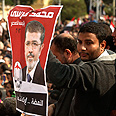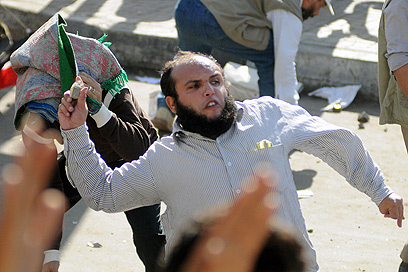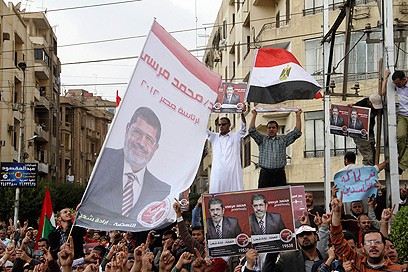
Report: Egypt army officers back anti-Morsi protests
During protests against Egyptian president's decision to grant himself sweeping powers, group of 'army officers' distributes leaflets saying, 'Legitimacy is on your side. We'll protect homeland with our lives'
The Egyptian army is beginning to intervene in favor of the public protest against President Mohammed Morsi decision to grant himself far-reaching powers, the London-based Arabic-language newspaper Al-Quds Al-Arabi reported Saturday.
According to the report, the "Officers of the Egyptian Army" organization distributed leaflets during Friday's demonstrations saying the protests were "legitimate." However, the army has yet to respond officially to Morsi's decree, which exempts all his decisions from legal challenge until a new parliament is elected.
Related articles:
- US has concerns about Morsi's moves
- Morsi: Egypt stands by Palestinians
- Morsi grants himself far-reaching powers
"We swear to Allah that we are not traitors and do not cooperate with anyone's agendas," the "officers" said in the leaflets. "We are loyal sons of the homeland."
"Egypt is in your hands now," the leaflets read. "We are not seeking positions or a revolt against legitimacy. We swore to protect the homeland with our lives. Now the legitimacy is on your side."
Supporters and opponents of President Morsi clashed Friday in the worst violence since he took office, while he defended a decision to give himself near-absolute power to root out what he called "weevils eating away at the nation of Egypt."

Anti-Morsi protesters riot in Cairo (Photo: AFP)
The edicts by Morsi, which were issued Thursday, have turned months of growing polarization into an open battle between his Muslim Brotherhood and liberals who fear a new dictatorship. Some in the opposition, which has been divided and weakened, were now speaking of a sustained street campaign against the man who nearly five months ago became Egypt's first freely elected president.
The unrest also underscored the struggle over the direction of Egypt's turbulent passage nearly two years after a popular uprising toppled Hosni Mubarak's authoritarian regime. Liberals and secular Egyptians accuse the Brotherhood of monopolizing power, dominating the writing of a new constitution and failing to tackle the country's chronic economic and security problems.
"I don't like, want or need to resort to exceptional measures, but I will if I see that my people, nation and the revolution of Egypt are in danger," Morsi told thousands of his chanting supporters outside the presidential palace in Cairo.
But even before he spoke, thousands from each camp demonstrated in major cities, and violence broke out in several places, leaving at least 100 wounded, according to security officials.

'Leave, leave.' Cairo protest against Morsi (Photo: AFP)
Security forces pumped volleys of tear gas at thousands of pro-democracy protesters clashing with riot police on streets several blocks from Cairo's Tahrir Square, birthplace of the Arab Spring, and in front of the nearby parliament building. Young protesters set fire to tree branches to counter the gas, and a residential building and a police vehicle also were burned.
Tens of thousands of activists massed in Tahrir itself, denouncing Morsi. In a throwback to last year's 18-day anti-Mubarak uprising, they chanted the iconic slogan first heard in Tunisia in late 2010: "The people want to overthrow the regime." They also yelled "erhal, erhal," - Arabic for "leave, leave."
Groups of protesters were still seen throughout Cairo on Saturday morning.
Morsi and the Brotherhood contend that supporters of the old regime are holding up progress toward democracy. They have focused on the judiciary, which many Egyptians see as too much under the sway of Mubarak-era judges and prosecutors and which has shaken up the political process several times with its rulings, including by dissolving the lower house of parliament, which the Brotherhood led.
His edicts effectively shut down the judiciary's ability to do so again. At the same time, the courts were the only civilian branch of government with a degree of independence: Morsi already holds not only executive power but also legislative authority, since there is no parliament.
In his decrees, Morsi ruled that any decisions and laws he has declared or will declare are immune to appeal in the courts and cannot be overturned or halted. He also barred the judiciary from dissolving the upper house of parliament or the assembly writing the new constitution, both of which are dominated by the Brotherhood and other Islamists.
The edicts would be in effect until a new constitution is approved and parliamentary elections are held, which are not expected until the spring.
Morsi also declared his power to take any steps necessary to prevent "threats to the revolution," public safety or the workings of state institutions. Rights activists warned that the vague - and unexplained - wording could give him even greater authority than Mubarak had under emergency laws throughout his rule.
AP contributed to the report
- Follow Ynetnews on Facebook and Twitter
- Receive Ynetnews updates directly to your desktop










